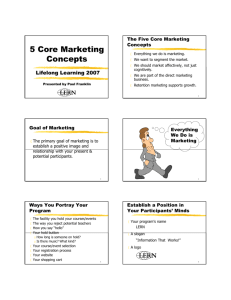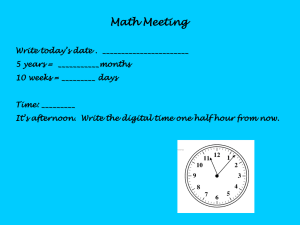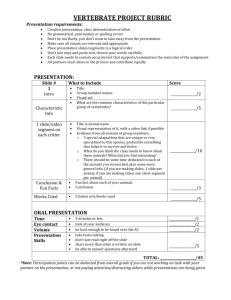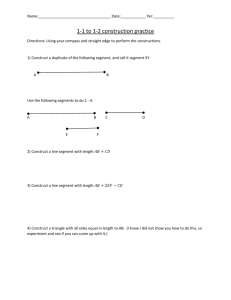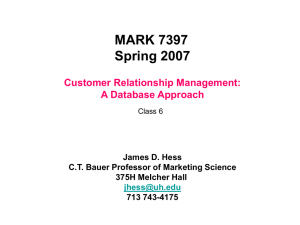Making Money with Contract Training
advertisement
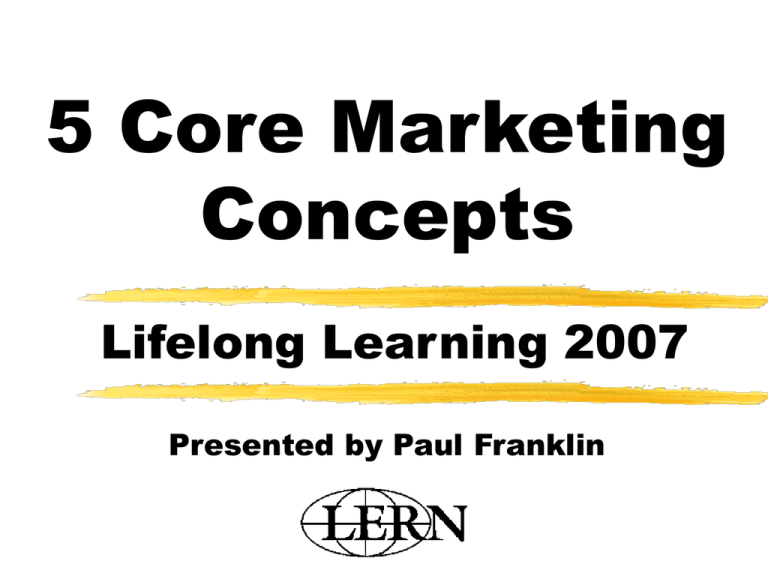
5 Core Marketing Concepts Lifelong Learning 2007 Presented by Paul Franklin The Five Core Marketing Concepts Everything we do is marketing. We want to segment the market. We should market affectively, not just cognitively. We are part of the direct marketing business. Retention marketing supports growth. 2 Goal of Marketing The primary goal of marketing is to establish a positive image and relationship with your present & potential participants. 3 Everything We Do is Marketing 4 Ways You Portray Your Program The facility you hold your courses/events The way you reject potential teachers How you say “hello” Your hold button Your Your Your Your How long is someone on hold? Is there music? What kind? course/event selection registration process website shopping cart 5 Establish a Position in Your Participants’ Minds Your program’s name LERN A slogan “Information That Works!” A logo 6 We Must Segment the Market 7 Segment the Market You want to segment the market because you serve some, but not all, demographic groups. There is no average participant. Average Segment 8 Market Segmentation A process by which you distinguish or differentiate your top customer groups, build separate demographic profiles, and then deliver different products, marketed by different promotions to your different customer groups. The ideal number of market segments is 7. 9 Market Affectively, Not Just Cognitively 10 Market Affectively, Not Just Cognitively You want to create a feeling about your program through your promotions. Market to people’s hearts, emotions and feelings, not just to their heads. Affective Cognitive 11 3-30-3 RULE 3 seconds to GRAB ATTENTION. That’s the job of the cover or headline. 30 seconds to answer the question – WHAT’S IN IT FOR ME? That’s the first two pages or first paragraph. 3 minutes to reinforce and bring ‘em to ACTION. That’s the balance of the piece and registration. 12 AIDA A = Attention = Cover D = Desire = Session/Course Description Plus other copy I = Interest = First 2 Pages A = Action = Registration Information and Form 13 We Are Part of the Direct Marketing Business 14 Direct Marketing Direct marketing can be measured, and you can find out what does and doesn’t work. Direct marketing is: Measurable Tracked and quantified Tested Mathematical relationships 15 Direct Marketing makes marketing more science than art EXAMPLE: Major brochure cover change Options: 1. Just do it. I know best and my graphics person agrees with me. 2. Split test new concept against the old and see which one works the best. 3. Focus group. 16 Direct Marketing makes marketing more science than art EXAMPLE: Title for new certificate program Options: 1. Staff brainstorm and I pick the best. 2. Survey “best” customers, quantify the results and use the one rated the highest. 17 Direct Marketing makes marketing more science than art Collect brochure response rates & analyze the results. Analyze responses for different dates mailed/e-mailed. Analyze mix of media. Analyze days of the week. Analyze venues. Collect data and analyze it all! 18 Direct Marketing Techniques… Make it more science than art. Take away some of the risks. Reduce stress. Make you more money. Lead to happier and more satisfied customers because you better appeal to them and their interests and needs. 19 Retention Marketing Supports Growth 20 The Value of Retention $$$$$$$$$$$$$$$$$$$$$$$$$$ It costs 6 times more to get a new customer than it does to retain a current customer. 21 Retention Marketing Supports Growth 2006 1K 2007 2K 500 Sign Up Both Years 50% Repeat Rate 500/1K = 50% 22 Repeat Business Provides Exponential Dollar Value The Power of Life Time Value…. 23 LifeTime Value 1 x average course/event fee (1-repeat rate) 1 (1-.66) x $100 = $303.30 24 *If you can increase the repeat rate, you will increase the LifeTime Value (LTV). 1 (1-.75) x $100 = $400 *If you can increase your average course/event fee, you will increase the LTV. 1 (1-.66) x $150 = $441.18 Repeat customers also generate customer referrals, which generate additional income 25 Thank You!
